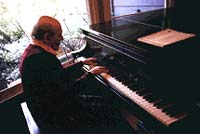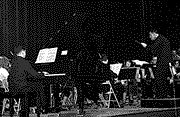![]()
1 | 2 | 3 | 4 | 5 | 6 | 7 | 8 | 9 | 10 | 11 | 12
2: Childhood Years
Armen started playing piano by ear at six years of age on an old upright piano in the basement of the Donelian home in Armonk, NY (near New York City). Armen loved music and pleaded with his parents for piano lessons. It was clear he had some musical talent, and from seven until 19 years of age his parents enrolled him at the Westchester Conservatory of Music in White Plains, NY. In the Fall of 1958 he began piano studies with Thomas Lishman and music theory with Doris Davidson. As he trained for a Classical concert career, Armen dreamed that someday he would compose and play his own music and tour the world, as Mozart did.
In the Spring of 1962, Armen nearly quit piano lessons after an emotionally wrenching jury examination given by the Conservatory director, Michael Shayne. During the exam, Armen, who was then 11, burst into tears and fled the room. His father urged Armen to reconsider his decision, and later bought an 1892 Steinway grand piano (which he still owns) as a way of encouraging him.
 The
following Fall, Armen's parents changed his piano teacher. For the next
nine years, Michael Pollon (1913-1996), his new instructor, became like
a second father to him, a father for music. A pianist and opera conductor,
Pollon was educated at the Berlin Hoschule for Music and emigrated to
the USA from Austria in 1939. Without his guidance, Armen would have had
little success in applying himself to approach the study of music with
the insight and tenacity it requires.
The
following Fall, Armen's parents changed his piano teacher. For the next
nine years, Michael Pollon (1913-1996), his new instructor, became like
a second father to him, a father for music. A pianist and opera conductor,
Pollon was educated at the Berlin Hoschule for Music and emigrated to
the USA from Austria in 1939. Without his guidance, Armen would have had
little success in applying himself to approach the study of music with
the insight and tenacity it requires.
Pollon had the rare ability to be demanding without being demeaning. He helped Armen uproot poor practice habits and replace them with productive ones. He insisted on cleanliness of execution, clarity of sound, evenness of rhythm and projection of melody, all timeless and universal musical virtues. Under Pollon's tutelage, Armen improved and earned a partial scholarship for the duration of his Conservatory education.
Along with Classical music Armen became interested in Jazz around the age of 12. His oldest brother, John, played clarinet in a Dixieland band. Armen was in awe of this band, which included several of his classmates who were members of the Ryerson family. The father, Arthur Ryerson, Sr., directed the band. Art, Jr. played trombone; Rich and John played trumpet; and Ali played flute. An eminent Jazz guitarist, banjoist and arranger who played with Louis Armstrong, Jack Teagarden, Paul Whiteman and many others, Ryerson, Sr. was also active as a studio musician in New York. He and his wife, Chick, of over 60 years now live in retirement in Connecticut.
Also, around this time Armen heard both Marian McPartland and Bobby Short play, and he was bitten by the Jazz bug. Eventually, he started playing in the Ryerson band, learning many Jazz standards and popular songs like "Georgia On My Mind," "The World Is Waiting For the Sunrise" and "Don't Get Around Much Anymore."
Armen loved the freedom of not having to read notes, of being able to play whatever he felt like playing as long as it fit with the song. One of his first professional engagements was a performance with the Ryerson band in the 1964 World's Fair in New York at 14, the same age at which he started giving piano lessons to earn money.
 During
high school, Armen played Jazz, Dixieland, rock, pop, bossa nova, blues,
folk, theater and many other types of music in all kinds of situations
including school dances, musicals, private parties, jam sessions, local
bars and talent shows. His uncle, Bart Sarkisian, a club date pianist,
bought him a fake book (known as "Book 1" among musicians) containing
all of the important standard tunes. Armen eagerly absorbed them. One
of his friends, guitarist Russ Fragos (whose father George co-authored
the well-known standard "I Hear a Rhapsody"), encouraged him to join the
musician's union as a way to obtain more musical employment. Armen even
arranged with his priest, the Rev. Kenneth Morris of St. Stephen's Episcopal
Church, to play organ in place of acolyte service.
During
high school, Armen played Jazz, Dixieland, rock, pop, bossa nova, blues,
folk, theater and many other types of music in all kinds of situations
including school dances, musicals, private parties, jam sessions, local
bars and talent shows. His uncle, Bart Sarkisian, a club date pianist,
bought him a fake book (known as "Book 1" among musicians) containing
all of the important standard tunes. Armen eagerly absorbed them. One
of his friends, guitarist Russ Fragos (whose father George co-authored
the well-known standard "I Hear a Rhapsody"), encouraged him to join the
musician's union as a way to obtain more musical employment. Armen even
arranged with his priest, the Rev. Kenneth Morris of St. Stephen's Episcopal
Church, to play organ in place of acolyte service.
Armen continued his rigorous ongoing Conservatory studies, which included bi-annual Classical solo piano recitals, concerto performances with local symphony orchestras including the Westchester Youth Symphony under the baton of Norman Leyden (pictured), concerts as a vocal accompanist and now Jazz improvisation as well. Armen also attended Armenian social gatherings at which the sound of Middle-Eastern dance music filled his ears. It was a rich and varied musical life which he lived.
